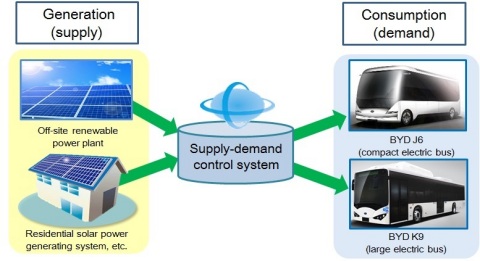
KYOCERA and BYD Japan to Collaborate on Integrated Energy System for Electric Vehicles
Through supply-demand project, the companies will maximize energy efficiency for EVs, and contribute to “Well-to-Wheel Zero Emission” policy
KYOTO, Japan: Kyocera Corporation (TOKYO:6971, herein “Kyocera”) and BYD Japan Co., Ltd. (herein “BYD”), the Japanese arm of China’s BYD Co. Ltd., a world-leading producer of electric vehicles (EVs), today announced a joint project to develop an integrated renewable supply-demand energy system for EVs. By combining renewable energy from Kyocera’s solar power generating systems and BYD’s electric buses, the collaboration will maximize the effectiveness of renewable energy, greatly reduce power losses, and maintain a stable supply-demand energy balance.
For this project, Kyocera will develop the energy charge management system to optimally control the supply-demand balance between energy production and consumption by using aggregation technology developed during Virtual Power Plant (VPP) test projects over the past several years. This system will also incorporate the Kyocera’s renewable energy generating system. Meanwhile, BYD will supply two models of electric buses; K9, a large electric bus already available to the global market and J6, a compact electric bus specifically developed for the Japanese market which will be available in spring 2020. Additionally, BYD will use its technological expertise in developing electric buses and insights from energy consumers to consult on the project.
Following the Paris Agreement of 2015, countries and private enterprises around the world have been working toward developing innovative solutions to tackle global climate change. Since automobiles are significant contributors to global CO2 pollution, it has become a top priority to improve their energy efficiency. In Japan, the Ministry of Economy, Trade, and Industry (METI) has encouraged the use of xEVs* as part of its “Well-to-Wheel Zero Emission” policy which aims to reduce greenhouse gas emissions by around 80% per vehicle, and up to 90% per passenger vehicle from 2010 levels by 2050.
In verifying the effectiveness of the supply-demand integrated energy system for electric buses, Kyocera will also explore the potential of other renewable energy applications such as independent power systems for residential, transportation, and ride-sharing services in collaboration with local communities, power retailers, and transmission and distribution system operators. Kyocera aims to demonstrate this energy system for EVs in 2020 with the goal of bringing it to market in 2021 after incorporating key findings from this collaboration with BYD.
About BYD
BYD Company Ltd. is one of China’s largest privately owned enterprises. Since its inception in 1995, the company quickly developed considerable expertise in rechargeable batteries and became a strong advocate of sustainable development, successfully expanding its renewable energy solutions globally with operations in over 50 countries and regions. Its creation of a Zero Emissions Energy Ecosystem comprising affordable solar power generation, reliable energy storage, and cutting-edge electrified transportation has made it an industry leader in the energy and transportation sectors. BYD is listed on the Hong Kong and Shenzhen Stock Exchanges. More information on the company can be found at http://www.byd.com.
About KYOCERA
Kyocera Corporation (TOKYO:6971) (https://global.kyocera.com/), the parent and global headquarters of the Kyocera Group, was founded in 1959 as a producer of fine ceramics (also known as “advanced ceramics”). By combining these engineered materials with metals and integrating them with other technologies, Kyocera has become a leading supplier of industrial and automotive components, semiconductor packages, electronic devices, solar power generating systems, printers, copiers and mobile phones. During the year ended March 31, 2019, the company’s consolidated sales revenue totaled 1.62 trillion yen (approx. USD14.6 billion). Kyocera appears on the “Derwent Top 100 Global Innovators 2018-19” list by Clarivate Analytics and is ranked #655 on Forbes magazine’s 2019 “Global 2000” list of the world’s largest publicly traded companies.
* xEV: HEV(Hybrid Electric Vehicle), BEV(Battery Electric Vehicle), PHEV(Plug-in Hybrid Electric Vehicle), FCEV(Fuel Cell Electric Vehicle)


















